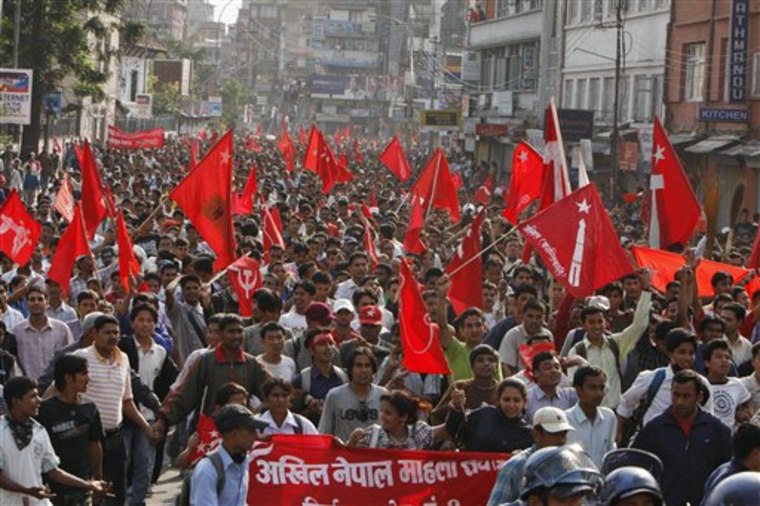Nepal's prime minister fired the army chief Sunday after a struggle over admitting former Maoist rebel fighters to the military, sparking mass protests and jeopardizing the survival of the country's first elected government.
The army chief's dismissal prompted a key political party to withdraw from the ruling coalition and frayed already tense relations between the government, dominated by former Maoist rebels, and the military they long fought.
The fallout could pose the biggest challenge yet for Nepal's troubled leaders who are new to politics and already struggling to provide basic services in the impoverished Himalayan nation.
The dispute between Prime Minister Pushpa Kamal Dahal, a former Maoist rebel leader, and army chief Rookmangud Katawal centered on the difficult question of how to integrate former rebels into the ranks of the army they fought for a decade — as required by a U.N.-brokered peace agreement.
Locked up their weapons
Since giving up their bloody rebellion in 2006 and joining the political mainstream, the Maoists have confined their fighters to U.N.-monitored camps and locked up their weapons. Dahal wanted them freed and admitted to the national army but Katawal resisted the move and clashed repeatedly with the government over the issue.
The government says Katawal also ignored orders to stop recruiting soldiers, boycotted last month's national games, and allowing eight army generals to continue working past their tenure.
"The army chief was removed because he failed to give a satisfactory explanation on why the government orders were ignored," said Information Minister Krishna Bahadur Mahara.
It was unclear if Dahal even had the legal power to remove the army chief. Nepal's constitution is currently being rewritten, but the army is officially under the command of the president, not the prime minister. The president is a member of the Nepali Congress, the main opposition party, which vowed to fight the decision.
The Communist Party of Nepal (United Marxist Leninist), the second largest party in the coalition government, withdrew from the coalition Sunday "to protest the prime minister's unilateral decision," the party's general secretary, Ishwar Pokhrel, said.
Leaders from several smaller parties walked out of the Cabinet meeting after Dahal announced his decision. They were debating Sunday night whether to withdraw their support completely.
Political analysts said the government could be on the brink of collapse.
"It has become almost impossible for the Maoists to remain in government in the present situation," said Ameet Dhakal, editor of Republica, a leading newspaper in the capital Katmandu. "It's a big crisis for the country now."
'Victory for people's rule'
Thousands of demonstrators filled Katmandu's streets Sunday, some to support the Maoist government and others to protest. Maoist supporters, waving red flags, called the army chief's sacking a "victory for people's rule" while the opposition blocked traffic and burned tires in protest.
Police were on high alert and security troops turned out in full force to prevent any violence. There were no reported injuries.
Anger is high in Nepal, where much of the public blames the Maoists for the power outages that can last more than 16 hours a day, the fuel shortages that have made for endless lines at gas stations, and the rising price of food and household staples.
But the Maoists are still revolutionary heroes to many, especially among rural villagers who voted them into power last year in Nepal's first elections. The centuries-old monarchy was abolished soon after.
Krishna Khanal, a political science professor at Tribhuwan University in Katmandu, said the Maoists could still survive the crisis.
"If the smaller parties decide to support the Maoists, then they can still run the government," he said. "But there is no immediate solution to the present political crisis."
